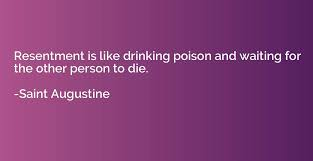Life is very, very short. Further, one’s perspective is limited and the ability to see one’s own life in a manner where one can hold all of the hurts and arrows that one has endured and understand that experience in a global context is impossible. Thus the expression “first world problems” exists. Obviously people who are survivors of abuse, life-threatening illness, the loss of loved ones, people who have witnessed trauma first hand, these are examples of challenges that do not simply fade away. These are challenges that endure, that require treatment and therapy and speak to the human condition, the ongoing search for healing, hope and new life.
But if we are being honest, truly honest, we must acknowledge that many of our grievances and hurts are not of this scale. I remember early on in my ministry hearing from family members who did not speak to one another because one sibling was given a treasured family heirloom while another was “passed over”. I know people who nurse the pain of working in an organization for many years and were never asked to assume a prominent role. I know people who resent it when others receive compliments that feel more fulsome and regular than they do from co-workers. Holding on to these kind of resentments and grievances hurts no one but the one who stews, who fumes, who counts the “hurts” like some sort of ancient code that being recited can somehow open the door to a long sought after reward. Except it doesn’t. No one cares that you do this. In fact those you resent for missing your genius, for passing you by, for neglecting to honour you, have no idea you are holding on to this. Your resentment is invisible to them. Thus should this pattern of hurt ever be reversed in your world there would be no one to say “wow, I had no idea how wrong I was…” The only one who will know you have surpassed some slight is you.
Life is short and as the band REM famously sang, “Everybody hurts.” Aside from the pain and hurts that constitute real and sustained trauma (where therapy is a must) most of us endure the garden variety of slights and arrows every day. It is a human experience. And when I think of the people who do endure the kind of hardship I cannot imagine, persons living in the 2/3 world without access to food security, shelter, drinking water, schools, etc…it does put my own challenges in proper perspective. As a Minister and an outreach worker I hear every day heart-breaking stories that make me want to go home at that very moment, hug my immediate family and thank my lucky stars for the blessings I all too often take for granted.
Of course I complain when I feel passed over or unfairly judged. But that experience lasts about as long as it takes to remember how other people live and what other people are forced to endure. I remember standing at my bus stop one day and after hearing the man on my right and the woman on my left complain for 20 minutes about the new seats on the bus being hard and plastic “not like the comfortable fabric ones we used to have” I simply responded in a calm voice, “this is surely the stuff of global hardship”. Cricket…
And so it goes that how we decide to live out our lives has a lot to do with the “perspective” we either see in our experience or we don’t. Either I put my own experience in a larger perspective or I don’t. I either try to see the world through other people’s experiences or I don’t. The reality is most people ignore us when we make “first world” grievances and most people are very empathetic when our pain is identified by claims of “she always gets the best seat in the staff room” or “he thinks he’s better than I am.” If you think people are sympathetic to you when you make these remarks you likely are not reading the facial expressions in the room. There might be a reason you are sitting by yourself.
And the person who loses in this scenario is…you. All you are accomplishing by holding on to these kind of grievances is you are robbing yourself of thoughts and actions that could bring you or someone else happiness. At the end of the day I will fight for my rights if I think I am being singled out for ridicule or criticism. But I will not think more than a minute about an off-hand remark or a gesture where I was passed over in a moment no one noticed but me. I likely have said or done likewise, so how can I judge others who a casual remark or mistake? We move on. It’s not worth it. Life is too short. At the end of my life I want to look back and think on all of the kindnesses I was able to offer and those extended to me. That’s the peace I want.

